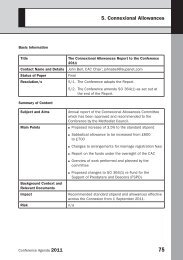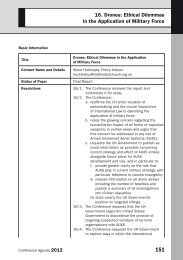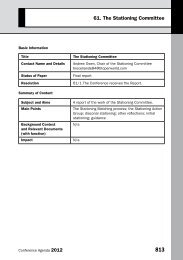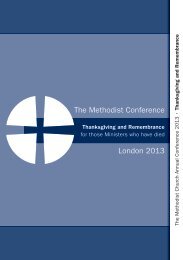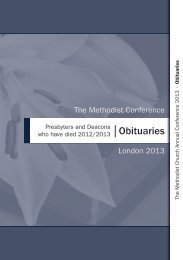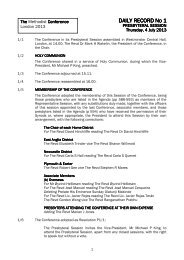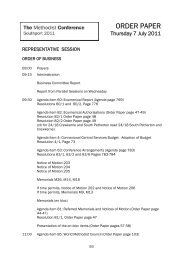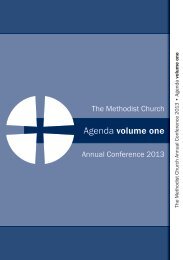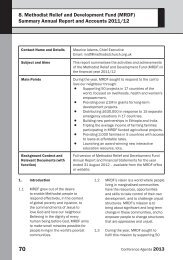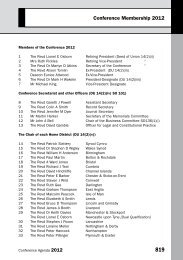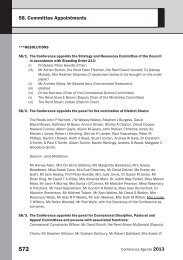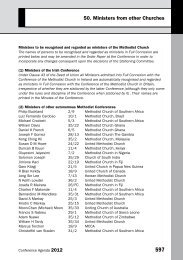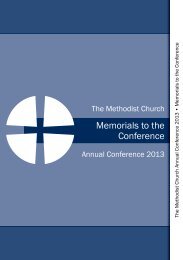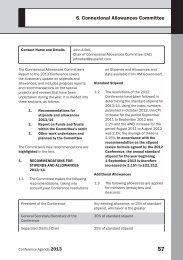Agenda Volume 3 - Methodist Conference
Agenda Volume 3 - Methodist Conference
Agenda Volume 3 - Methodist Conference
Create successful ePaper yourself
Turn your PDF publications into a flip-book with our unique Google optimized e-Paper software.
57. The Fruitful Field Project<br />
the current provision does not make<br />
efficient use of resources and is not<br />
sustainable. We agree that radical<br />
change is needed.” A researcher<br />
and lecturer’s submission noted that<br />
“it has always been clear, from the<br />
early conversations [in 2005] that<br />
change was needed. The replication<br />
and multiplication of resources for<br />
theological training provided a rich<br />
field of opportunities for training.<br />
However, the greenhouse growth of<br />
those resources has been shown<br />
to reflect some poor stewardship<br />
of our resources. The vine was not<br />
pruned as it grew and now the fruit is<br />
shown to be wanting.” The Committee<br />
concurred with this widely shared<br />
judgement that sponsorship of a<br />
range of institutions, colleges and<br />
centres was leading to replication,<br />
fragmented provision, missed<br />
opportunities for cross-fertilisation<br />
across and between activities, and an<br />
inefficient use of resources.<br />
203 The Committee’s deliberations about<br />
other aspects of the Discipleship<br />
and Ministries Learning Network also<br />
argue for a limited number of centres.<br />
A focus on equipping and supporting<br />
regional teams dictates a necessarily<br />
limited focus on centres. Given a<br />
limited focus, and a consequently<br />
limited pool of resources, there is a<br />
significant risk that the dispersal of<br />
already limited resources across a<br />
number of centres would restrict their<br />
effectiveness and diminish their longterm<br />
sustainability.<br />
204 Furthermore, the Committee’s<br />
description of the marks of centres<br />
(see paragraph 200 above) clearly<br />
indicated to the Committee that<br />
centres structured along these lines<br />
were complex institutions. A focused<br />
commitment to the responsible use<br />
of energy and resources is required<br />
to establish sustainable centres<br />
which can deliver this broad range of<br />
activities to the highest standards.<br />
Coordination of these activities<br />
across a number of centres would be<br />
extremely complex, and it would be<br />
extremely likely that provision would<br />
again become fragmented.<br />
Reducing the number of centres<br />
205 The recommendation to establish a<br />
Discipleship and Ministries Learning<br />
Network, containing within it a strictly<br />
limited number of centres configured<br />
to make contributions along the lines<br />
outlined in paragraph 200 above,<br />
allowed the Committee to make, in<br />
turn, some initial recommendations<br />
about the <strong>Conference</strong>’s sponsorship<br />
of a number of institutions, colleges<br />
and centres.<br />
ERMC, SEITE, STETS and SWMTC<br />
206 The Committee recommends that<br />
the <strong>Methodist</strong> Church should, in an<br />
organised and structured manner,<br />
withdraw its sponsorship from the<br />
Eastern Region Ministry Course<br />
(ERMC), the South-East Institute<br />
for Theological Education (SEITE),<br />
the Southern Theological Education<br />
and Training Scheme (STETS) and<br />
the South-West Ministry Training<br />
<strong>Conference</strong> <strong>Agenda</strong> 2012 727



